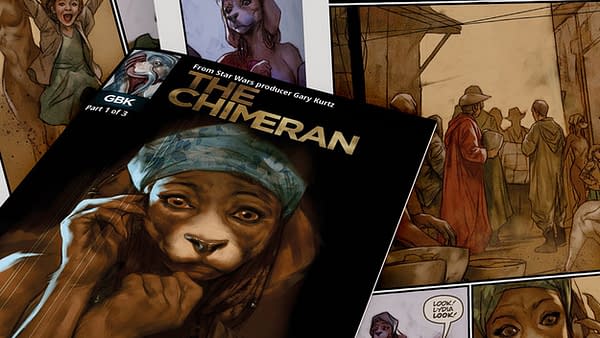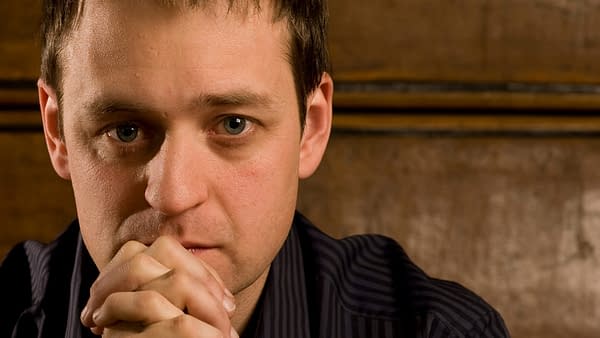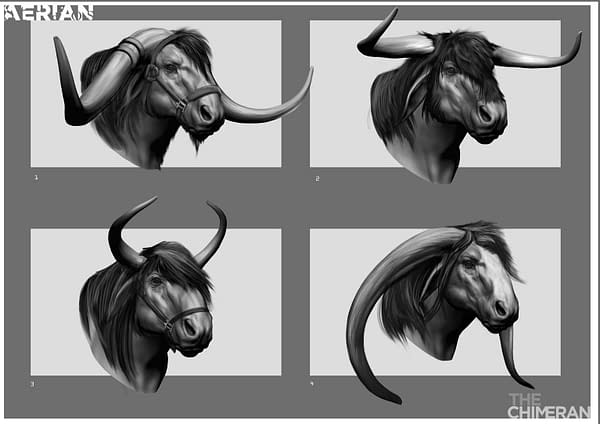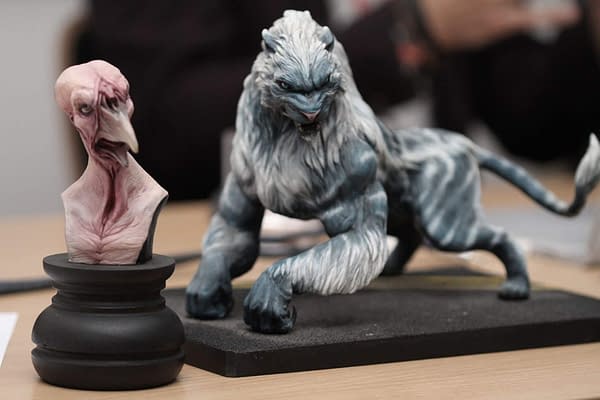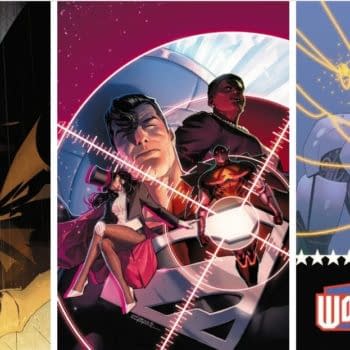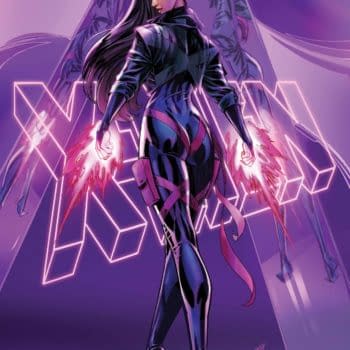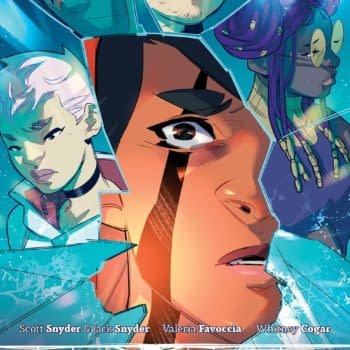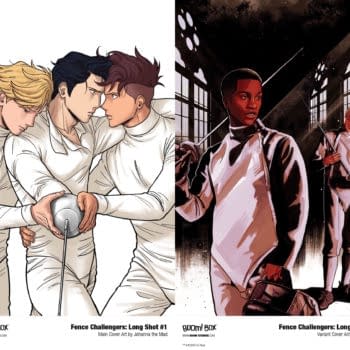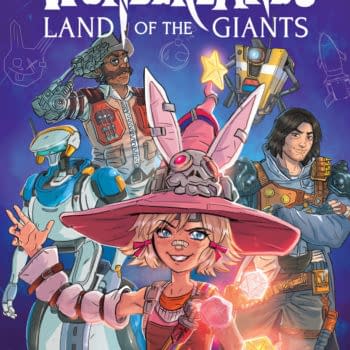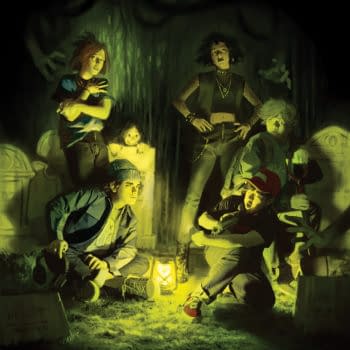Posted in: Comics | Tagged: Comics, entertainment
Star Wars' Gary Kurtz's The Chimeran Under The Spotlight
By Olly MacNamee
This weekend, at Birmingham's International Comic Expo (ICE) saw the exclusive launch of Gary Kurtz's new trans-media venture, The Chimeran to a packed room of very interested fans. Along for the ride were Ringmaster Paul Goodenough (How To Train Your Dragon), Richard Bazley (The Iron Giant and Harry Potter) and Simon Furman (Transformers) with Goodenough happy to take the reins for the majority of this fascinating and informative panel. So, with smart phone in hand, I tracked down Paul, who was good enough (sorry, Paul, as I'm sure I'm not the first to play on your surname) to give me an exclusive interview to hear more about the proposed TV series and initial preview comics.
Olly MacNamee: In your presentation you got the ball rolling with an interesting TedTalk in which hybridity and cross-breeding – man playing at being gods – was presented. Clearly, The Chimeran is a sci-fi story, but it is fair to say it's actually grounded in sic-fact?
Paul Goodenough: Absolutely. There's a whole raft of hybrid work that has been happening for a number of years now, some of which is in the public eye, and those which are further away from the public eye too. We wanted to show you all what was happening now and what is happening now is that there are chimerans, animal hybrids, being born and raised and allowed to live for a certain amount of days across the world. The amount of life they get is decided by government law, which changes from country to country, ranging anywhere between 60 – 150 days. Then, they get slaughtered. All of the things we've based our story, our world on in The Chimeran is based on science fact or historical fact. However, if that hybrid is privately owned, as a pet, say, then this presents a real life loophole in this law. They don't need to be put down.
OM: We saw interior pages for the three preview comics you have ready to go. What's the reason for these comics and can you tell me more about some of the characters in them?
PG: The idea about the preview comics were created, firstly out of a love of comics myself, and also because TV and film execs are very, very busy people as are many people in those industries. Getting a script in the post, even if it's just for a TV pilot is a hefty amount to get through, so one of the things we realised a few years ago now is that it is far better and more effective to give someone a small visual introduction to the story so that is where the idea of a comic was born from. Each of the three preview comics looks at a different part of The Chimeran story viewed through three principal characters, Lydia, Beachell 'Beach' Devries and McCulloch, with Lydia being a canine chimeran, Beach being the creators of the chimerans and McCulloch being someone who used the chimerans almost as weapons. As I mentioned in our panel yesterday, that's a really important theme for us. When humankind created knives and axes they were meant to be used as tools. It the same principle for the chimerans in our story; they were bred for a specific purpose. McCulloch, in the third issue, he's like that person, somewhere in the past, who saw an axe and realised he could make it a weapon in his hands. So, the idea behind the three preview comics was to be able to send them to actors, to producers, broadcasters as an entry point that we can then follow up with a full script. Once we've got ourselves a confirmed deal, we hope to give away these comics to the public.
OM: This is certainly a very well thought out, developed world already. How did this come about?
PG: I hope this doesn't sound like I'm blowing my own trumpet, but mostly through me as the main creator throughout the whole process. Gary Kurtz, the Star Wars producer and Richard Bazeley, who's worked on The Iron Giant and Harry Potter approached me with their very broad concept. The broad concept of human/animal hybrid theory and whether I could write a premise based upon that. From that early starting point I started to work on researching the science, which parts of humanity are in need of help; a lack of food production, manufacturing problems; problems we could all very well face in the future and then from that I started to develop chimerans who could answer those problems and what animals could be put together to answer these problems. Once I'd sketched a few ideas I then started to work with a concept team, and Ryan Firchau was a great help during this process, and then we worked up a series of chimerans that could fulfil the functions society would need of them. From there, that's when Gary (Kurtz) got involved in the world creation. How could we take a world-wide story; something that affects the entire world of The Chimeran and turn it into a microcosm, make it manageable?
We came up with the idea of the camp, which is a walled community, a living breathing experiment to see whether humankind and chimerans can live and function together. Once we had that, the story, kind of, wrote itself. Once you had that premise of everyone stuck in a pressure cooker situation you realise that everyone in the story is going to look after themselves first. They've all got problems, families to look after or just hidden agenda, they want to get ahead of the curve. Once you start developing these scenarios, the stories start bouncing off each other. A good analogy form TV would be Spartacus, or Game of Thrones where you realise very early on what agendas different characters wish to pursue and you can see, as a viewer, there's no way some of these agendas can end well.
OM: Right. Well, speaking about the planned TV series, there are some very familiar faces to the characters depicted on issue 2 (a spitting image of House actor, Hugh Laurie) and 3 (John Hannah, of The Mummy fame). Is this your way of announcing your cast wish list maybe?
PG: It is a wish list. What people tend to do in TV and film is say what type of actor you might want for a particular role and that's what we've done. The Beach character, for example, is a character slightly at odds with other human beings in the same way as the character of House MD, played by Hugh Laurie, really fitted quite well with Beach's character in our story. The arrogance that one would need to be in the position Beach is in, to re-write humanity, you need to be in a certain mind-set which in turn lends itself very naturally to having a certain actor, who many people would be aware of, in our story. This was true of the McCulloch character, who like Batiatus in the TV show, Spartacus, is wonderfully corrupt and reprehensible character but you love him all the same, because you can see these horrific and terrible things he does but you understand why he does these things. McCulloch is that character. You know, he's the guy who does all the horrible things and abuses people, he's a morally reprehensible: Tony Soprano meets Batiatus (who happens to be played by Hannah!).
OM: Why TV then and not film for The Chimeran?
PG: Well, it did start off as a film treatment and went around for a few years, doing the rounds, us getting feedback and editing the storyline to fit the feedback. There's that old edict in Hollywood, which is, "Do me the same thing but different." But with the huge financial risks in Hollywood people are doing this the wrong way round and giving us a different thing, but the same, which means we are given interchangeable brands, but with the same story at its core. There are any numbers of 'floating apocalypse' machines in the sky; The Avengers, Ghostbusters, The Suicide Squad, you see the same tropes again and again. You can't expand as much in a film and get to know these characters to truly fall in love with them. If I was to ask fans to name their favourite Game of Thrones character, they would very expansively be able to talk at great length about. You ask the same question about, say, The Suicide Squad, they won't be able to because you don't get enough time with them. Even from just a financial point of view, investing in a feature film is a very expensive thing. You've paid for the CGI, you've paid for the sets, and you've paid for the marketing, the actors. In TV, you get to reuse those things, in our case, for thirteen episodes. The model for a subscription based model, for example Netflix, HBO, means that they've got their ready-made audience and the marketing department can promote within their platform so it takes a chunk of risk away. They can also be a bit more innovative too. We wanted to spend more time with our characters and see how the world could evolve and it makes financial business sense too.
While it's too early to announce any deals, we are negotiating and we believe we may be able to announce a major deal within the next few weeks.
OM: Well, when you do, you know where we are, Paul. Many thanks for your time.


